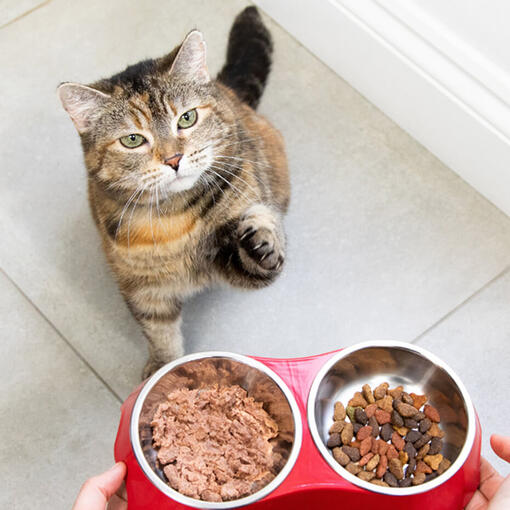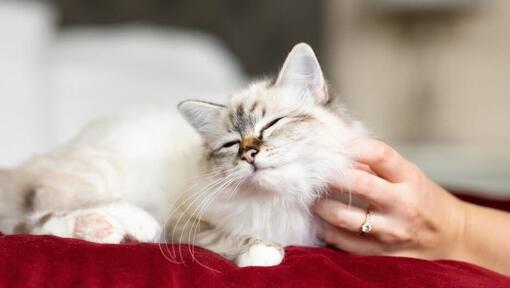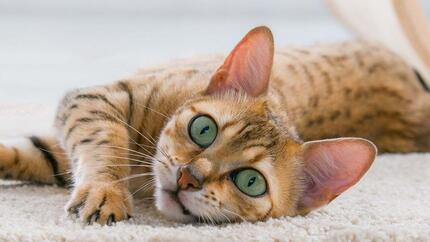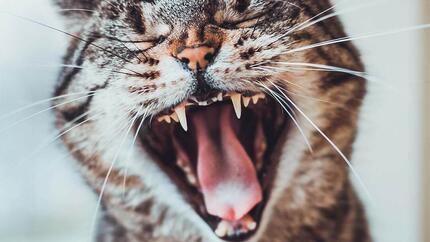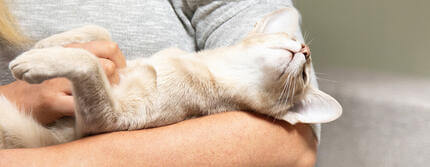
Discover the meaning behind why your cat makes hissing or purring sounds with our handy guide, and before you know it you'll be able to translate what your kitty is trying to tell you like a pro!
When cats make noises, they’re trying to communicate a feeling or desire. Whether they are purring whilst being groomed, or hissing at another animal, cat sounds can all be roughly translated into human language. So, you can roughly understand what your cat is trying to communicate!
The types of cat sounds are specific to your pet. Some cats are more vocal than others and your pet may have a very particular way of expressing themselves through sound. Cat noise meanings can be split into five different categories, which all have their specific purpose.
While all cats are individuals, some breeds are known to be noisier than others. Similarly, the age of your cat also impacts on how vocally communicative they are likely to be. Kittens are notoriously vocal, with their adorable mewling and meowing, whilst more senior cats tend to be quieter.
Different types of cat sounds
The most commonly heard cat noise is the classic ‘meow’. Generally, this sound is used to demand attention. Kittens meow almost constantly, always in search of their mother’s love, milk, or attention. In older animals, it is less often used to communicate with other animals and will more frequently be heard in the presence of humans.
Not all meows sound the same, or mean the same thing. Although your cat will have their distinctive way of meowing, it is possible to generally categorise some of the types of meowing that are most commonly heard.
The standard meow
You will recognise this kind of cat sound easily, as it will be the one that you hear the most! In general, these kinds of meows are mid-length in duration and mid-pitch in tone. When you hear it, it’s because your cat is asking for something. It’s then down to the context to try and decipher exactly what that want.
The ‘mewl’
This shorter meow is used as a kind of greeting for owners. It may be accompanied by rubbing against your legs.
The long, drawn-out meow
This kind of cat sound means that your pet is demanding something specific. It may be that they’re reminding you that it’s dinnertime, or that they want to be let outside. Some owners will complain that this kind of meow wakes them up at night, or early in the morning when they’re ready for breakfast.
Repeated meows
A standard sounding meow that is repeated over and over again is a sign that your cat is excited.
High-pitched meow
This kind of meow can often sound more like a yelp due to the high pitch—and that is often what it means! Your cat will make a high-pitched meow sound when they are suddenly startled or hurt.
Low-pitched meow
This type of meow can be translated into a complaint or long-term grumble. It’s less a demand for attention and more an ongoing grievance! You may hear this when it’s way past dinnertime and the food bowl is still empty.
Purring
Cat purring is often simply understood as a sign of pleasure. However, there are situations in which a cat will purr when it’s not due to pleasure. Discerning this exact cat noise meaning often comes down to the context.
A cat purr is low in tone and sounds slightly like a rumble. It’s a soft and comforting noise, so it makes sense that it is often heard in situations when your cat is feeling content. If partaking in their favourite form of comfort—be that grooming, stroking, or a scratch behind the ears—your cat’s purrs will signal that they are enjoying themselves, and they want to let you know!
On some occasions, cat purring can be a sign that your pet is in pain or discomfort. Research has shown that purring is used as a form of self-soothing in cats. If your pet is showing other signs or symptoms of being unwell and is purring unprovoked, it may be that they are in some kind of pain.
Chirping or chattering
This excited-sounding cat noise can be difficult to describe! Some call it chirping, others call it chattering. It might also sound like a form of bleating or a stuttered meow. It isn’t the most common cat noise to be heard, but once you hear it, you’ll know it!
But what does this specific cat sound mean? The theories on why cats chatter vary, but most believe that it’s something to do with their natural hunting instincts. This is because a ‘chatter’ is most likely to be heard whilst a cat is watching or stalking birds, or another form of prey. It could be vocalised frustration, as your cat watches birds through a window and can’t reach them. Or it could be excitement, in anticipation of a productive ‘hunt’.
Some scientists, having conducted research in the wild, believe that chattering may even be a hunting tactic. They claim that cats are mimicking the noises that their prey makes in an attempt to lure them into a false sense of security.
The ‘caterwaul’
The caterwaul is another cat noise that once heard is never forgotten! This shrill, wailing noise can sound like your pet is in pain, but it’s actually elicited when a cat is in heat.
This sound is most commonly made by cats that haven’t been spayed or neutered. When in heat, cats will caterwaul to attract the attention of the opposite sex. This very noisy cat sound is the main way that your pet will let others know that it’s time to mate.
Hissing
Hissing often sounds aggressive or frightening, so it’s no surprise that this is the cat noise that is elicited when your pet feels threatened, angry or is in pain.
Cats most often hiss at other animals. They may be involved in territorial disputes or have another kind of cat argument. If your cat is hissing and there is no indication as to why they are being provoked, it may be a sign that they are feeling unwell or are in pain. If unprovoked hissing continues, you should seek a vet’s advice as it may be a sign that your pet is in pain with an undiagnosed condition.

